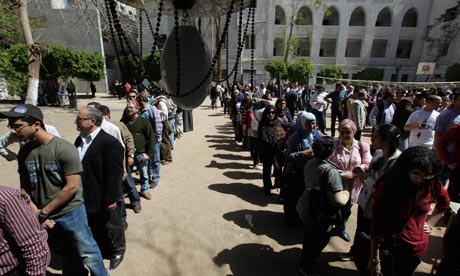Egyptians turn out in big numbers to vote on constitutional change
![]()
Referendum is first major test of transition to democracy in wake of Mubarak’s resignation

Hundreds of Egyptians line up at outside a polling station in Cairo, Egypt, to vote on constitutional amendments. Photograph: Amr Nabil/AP
Eager for their first taste of a free vote in decades, Egyptians lined up by the hundreds on Saturday to vote on constitutional amendments sponsored by the ruling military.
The nationwide referendum is the first major test of the country’s transition to democracy after a popular uprising forced Hosni Mubarak to step down five weeks ago, handing the reins of power to the military.
Early signs show an unusually big turnout, with lines forming in the hours before polls opened. They snaked along the streets in Cairo and other Egyptian cities, with men and women standing in separate lines as is customary in the conservative and mainly Muslim nation.
The vote promises to be the freest in Egypt since 1952 when the monarchy was ousted and the multiparty democracy that functioned under British colonial rule was ended. Egypt has since been ruled by men of military background, with fraud and extremely low turnout defining every nationwide vote.
“This is a historic day for Egypt,” deputy prime minister Yahya al-Gamal said after casting his vote in Cairo. “I had never seen such large numbers of voters in Egypt. Finally, the people of Egypt have come to realise that their vote counts.”
Voters were asked to choose yes or no for the whole package of nine changes, which would open elections to independent candidates, impose presidential term limits and curtail 30-year-old emergency laws that give police near-unlimited powers. Preliminary results will be announced on Sunday.
A yes vote would allow parliamentary and presidential elections to be held later this year or early in the next, a time frame that critics say is too soon for the dozens of political groups born out of the 18-day anti-Mubarak uprising to organise themselves and be able to compete in elections.
They say the timetable would benefit Mubarak’s one-time ruling National Democratic party (NDP) and the Muslim Brotherhood, the two most powerful and best-organised political groups in Egypt.
The NDP is blamed for the rampant corruption and fraud that marred every election in Egypt during Mubarak’s 29-year rule. The brotherhood, which has strongly campaigned for the adoption of the changes, advocates the instalment of an Islamic government in Egypt. The ambivalence of its position on the role of women and minority Christians worry large segments of society.
Leading the no campaign are two presidential hopefuls, the Nobel laureate and former head of the UN nuclear watchdog agency Mohamed ElBaradei, and Arab League secretary-general Amr Moussa, who is a former foreign minister in Egypt. “This is a truly democratic process,” Moussa said after he voted in Cairo.
ElBaradei said in New Delhi that Egypt’s newly formed political parties need more time to prepare for elections after decades of repression.
Egypt’s Coptic Christians were also overwhelmingly against the amendments. Comprising 10% of the population, Christians complain of institutional discrimination and fear their quest for equal rights would suffer a serious setback if the brotherhood gains influence in post-Mubarak Egypt.
“If the Brotherhood comes to power, they will not benefit anyone, Muslims or Christians,” said Fawziya Lamie, a 39-year-old Christian nanny, after casting a no vote in the Cairo district of Manial.
More than half of Egypt’s 80 million people are eligible to vote. The military, in a bid to get the vote out, has decreed that voters would be allowed to cast ballots at any polling centre in the country with their national ID cards as the only required proof of identity. They are required to dip their index finger in ink after voting to prevent multiple balloting.
“My vote today will make a difference. It’s as simple as that,” first-time voter Hossam Bishay, 48, said as he waited in line with about 300 others outside a heavily guarded polling centre in Cairo’s upmarket Zamalek district.
“I am very excited to be doing this,” Alaa al-Sharqawy, an engineering lecturer, said. “It’s true that the amendments have polarised us, but I am glad we are voting.”
The constitutional amendments drawn up by a panel of military-appointed legal scholars are intended to bring just enough change to the 1971 constitution, which was suspended by the military, to ensure presidential and parliamentary elections are free and fair.
In addition to allowing independent and opposition candidates to run, they would restore full judicial supervision of votes, a measure seen as vital to preventing fraud. They would also limit presidents to two four-year terms and curb the emergency laws that have long been a chief complaint of the people.
Critics have used social networks such as Facebook and Twitter and full-page advertisements in newspapers to argue that the entire constitution must be scrapped and a new one drawn up to guarantee Egypt is spared future dictators.
Related Articles
CLUSTER BOMB BAN TREATY TAKES EFFECT WORLDWIDE
![]()
In recent weeks, Moldova and Norway destroyed the last of their cluster munitions © APGraphicsBank The worldwide ban on cluster bombs
Policing the Crisis
![]()
The London Riots in Historical Perspective The conflagration currently consuming London and other cities in the English Midlands is generating
Velasco profundiza en el ataque a EPPK y manda a la cárcel a su interlocución
![]()
El juez de la Audiencia Nacional Eloy Velasco ordenó ayer encarcelar a los ocho interlocutores de EPPK a quienes


